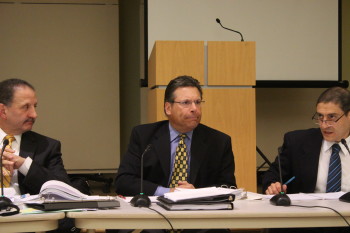Photo: Faud Mukarker (right) before the Board of Selectmen
After a sometimes contentious meeting which appeared an agreement would unravel before one could be struck, the Belmont Board of Selectmen voted unanimously on Monday, Jan. 9 to grant a “pour” alcohol license to Faud Mukarker, owner of The Loading Dock on Brighton Street.
But the approval came with two significant conditions imposed on the permit, preconditions the board required of Mukarker who only four months previous transferred an all-alcohol retail license for a $400,000 “compensation fee” to regional supermarket chain Star Market.
Under the conditions accepted by Mukarker, the business is required to pay $11,000 in back payments he owes to Belmont Light, the town’s electrical utility, and he will accept the decision of a Special Town Meeting likely scheduled for February if the 290-member legislative body approves a complete ban on transferring alcohol licenses or the use as collateral in securing loans.
After the meeting, Mukarker appeared more relieved than pleased leaving the hour and 20-minute marathon hearing.
“I am happy we got the license,” said Mukarker after the decision, who said the “pour” license was critical to his operation surviving financially.
He also said “I will follow anything the [Special Town] Meeting decides” on transferability.
But crafting the agreement was anything but a smooth journey. After an hour of hearing public comments and the give and take between the board and Mukarker and his team, the first attempt at a consensus to move forward took the business owner and his supporters by surprise.
Mukarker began the meeting by pledging not to transfer the license for two years and not use it as a guarantee for collateral for one year. But those bans were less than airtight as he wanted a mechanism to return to the board during the time of the voluntary restriction to ask to lift the prohibition.
The public was divided in its support for and opposition to the proposal. Elizabeth Dionne of Wellesley Road said Mukarker had shown bad faith with the sale of the previous license which was used to pay off a mountain of bills.
“If he does not have a viable business, you do not have any business granting him another license,” she told the board.
Kenny Hamilton, who described himself as the “The Loading Dock’s consulting CFO” and “right-hand man,” said Mukarker was “always” seeking a pouring license since a Small Business Administration loan which was part of the firm’s refinancing program required the owner having one.
“So the viability of the business has always been there,” said Hamilton, demonstrated by the business surviving 16 months without selling alcohol to customers.
“I know for a fact that Mr. Mukarker feels very badly about the stress he put on the selectmen … and the citizens of the town,” said Hamiliton. “So the idea how he won the lottery … that is not the case.”
Hamilton, who said he “guided the finances” of the business, did provide interesting financial information concerning the business including that the renovation of the former White Hen Pantry into the new eatery cost Mukarker $3 million, with the owner spending $1 million from his pocket.
But it was revealed Mukarker was playing with a weak hand as information of his financial issues were laid out on the table. Town sources report the Loading Dock being $11,000 in arrears to the town for an unpaid electric bill and has been placed by the utility on a long-term payment plan to begin chipping away at the debt.
Second was the restaurant had yet to close on the Small Business Administration loan to pay for outstanding bills despite telling the board it was all but finalized. Also, the $400,000 from Star Market had yet to be delivered to Mukarker.
Finally, Hamilton noted the business’ original lender, Leader Bank, “did not have faith in the project” which required Murkarker to accept a plan designed by Eastern Bank to continue running the retail/restaurant store.
For Selectman Chair Mark Paolillo and his vice chair Sami Baghdady, the concerns of the business’ financial viability and Mukarker’s past action with the retail license allowed them to play hardball with the business.
“My concern is that without any restriction, what happens if God forbid if you go bankrupt? If the SBA loan doesn’t close?” said Baghdady.
The first counteroffer by Baghdady to Murkarker took the breath away from The Loading Dock supporters: withdraw the application and reapply in six months during which time the business would close on all the loans and other issues.
“Regarding transferability, we need the guidance of Town Meeting,” said Baghdady.
During the period without a permit, the restaurant would “have alternatives” said Baghdady, including to serve alcohol from customers who brought their bottles – under a “BYOB” provision in state law – and request one-day liquor licenses.
Under that scheme, the sensitive issue of transferability would not be a problem, said both Baghdady and Paolillo.
Murkarker and Hamilton issued a complaint that the board’s initial plan would place the restaurant’s future in jeopardy while Hamilton said bank and SBA loans would need to be “redone” creating an even greater time delay.
Selectman Jim Williams came to Murkarker’s defense, saying the limitations on the licenses were anti-business.
It had taken another 10 minutes before the selectmen arrived at the compromise of Murkarker making his electrical bill whole and accept the vote of the Special Town Meeting.
“Sometimes coming to an agreement that everyone can agree to is a little messy,” said Baghdady.

